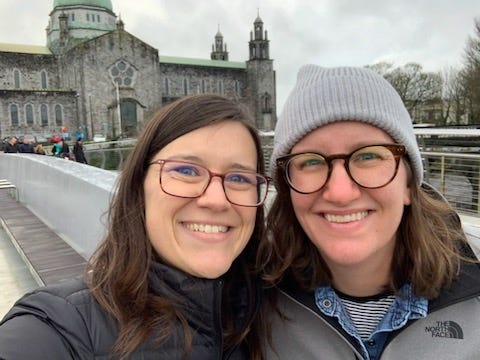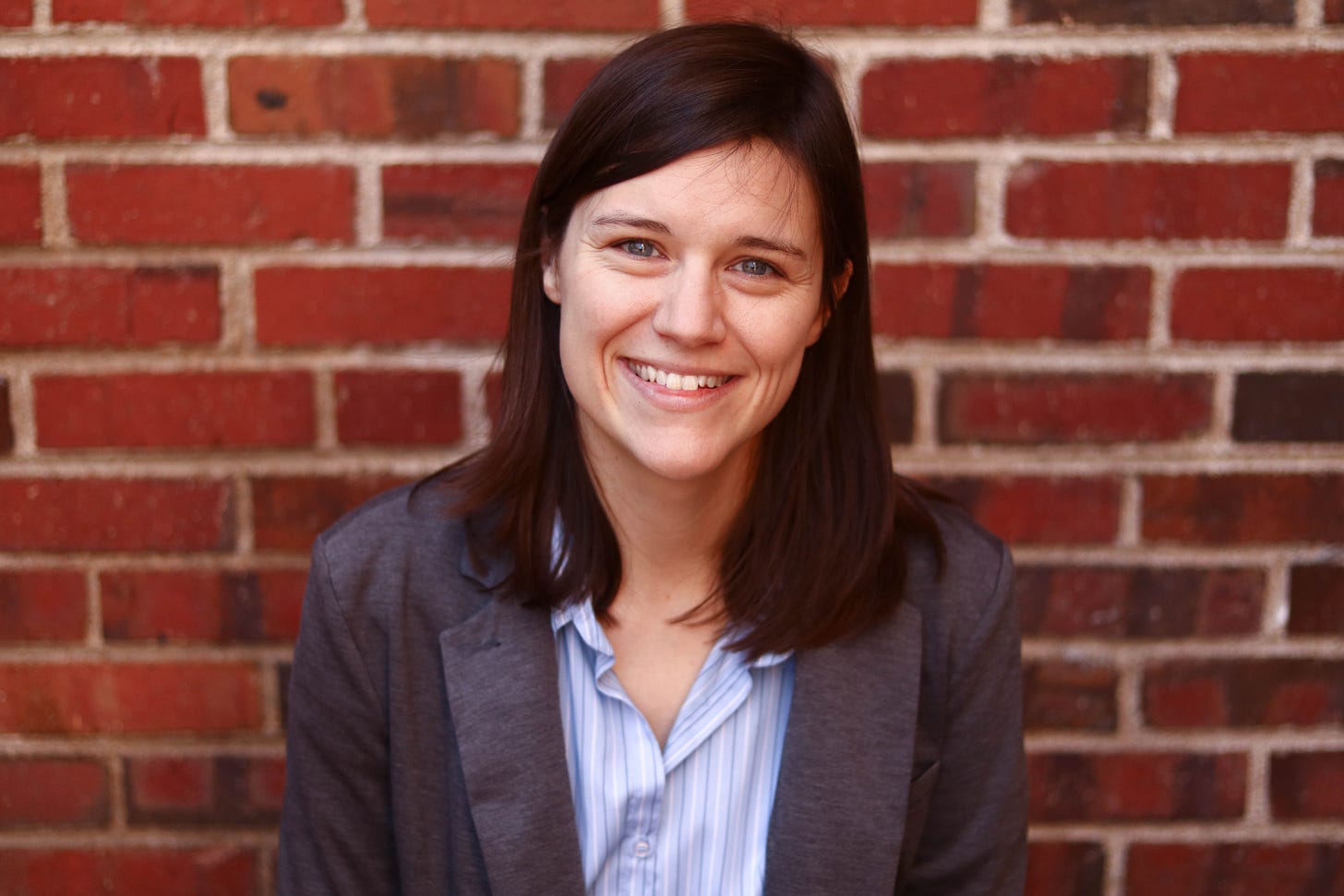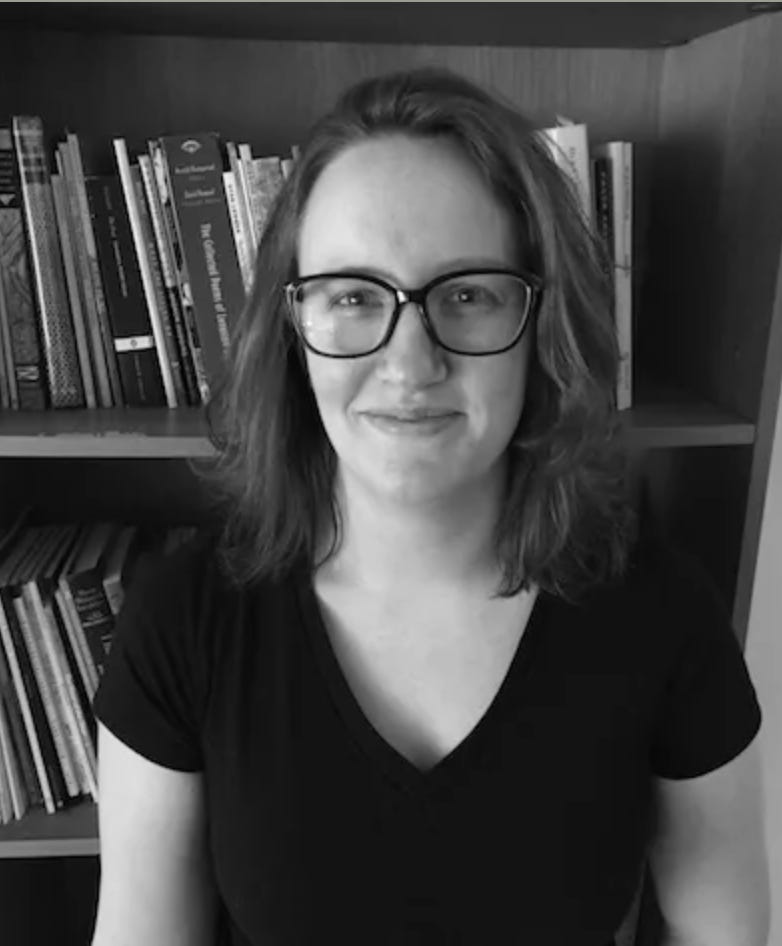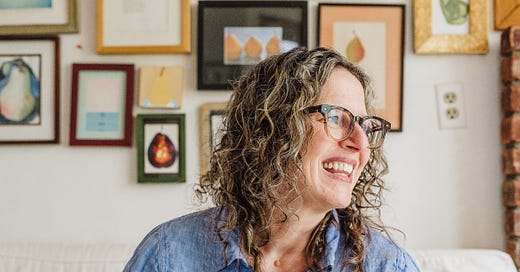

Discover more from Write More, Be Less Careful
"my kids are expanding my sense of possibility for how to be in the universe, and that can only be good for my writing."
writers Alyse Knorr and Kate Partridge on the wonder and boredom of little kids, and why their "unsexy" plan for dividing time is actually the key to sustaining a creative life *and* a happy marriage
Hello there! Welcome to Write More, Be Less Careful, a newsletter about making space for creative practice in a busy life. I’m a poet and an essayist, and my most recent books are the poetry collection Pocket Universe and the anthology The Long Devotion: Poets Writing Motherhood, which I edited with the poet Emily Pérez. My next book, The Good Mother Myth, will be out in January 2025, and you can pre-order it now!
This is a good creatures interview, a series that explores the intersection of caregiving and creative practice. If you know (or are!) a good creature whose work we should feature, send me an email—you can just reply to this newsletter.
Today’s interview is our first to feature a couple, writers Alyse Knorr and Kate Partridge. I met Alyse when we were at the Vermont Studio Center in January 2023, when her wife Kate was pregnant with their second child. I’m always fascinated by how couples who are both writers (or artists) make it work, and I wanted to hear from Alyse and Kate together. I was thrilled when they agreed to a joint interview, and I love the way they talk about their commitment to their creative practice, their family, and sharing the work.
Below, we talk about the “busy boredom” and wondrous perspective shifts of life with small kids, using prompts to get started, and making a plan to split caregiving duties.
Who do you care for?
Alyse: We have a 5-year-old daughter and an 1-year-old son. Also a very naughty cat named Jeffrey, after the cat in this Christopher Smart poem. These are our dearest and most immediate wards, but of course as professors, we also have anywhere from 20-70 students and advisees each semester, and teaching work is care work. One of the mottos of Regis University, the Jesuit school where we work, is “cura personalis,” meaning “care for the whole person.” The idea is to strive to care for students as more than just academic entities, but also to look out for their physical, mental, emotional, and even spiritual wellbeing. It’s something I really love about my institution–it’s deeply fulfilling work.
Kate: Everyone that Alyse has named above—we share them, including many of our students. We manage very well as co-parents and colleagues, I think, and I’ve found it sustaining over the many years we’ve worked together to have a partner who is balancing the same caregiving challenges I am, day in and day out. There’s a shorthand that develops when we’re both advising the same student who is struggling, for instance, or trying to research different approaches to a challenge with one of our kids.
What kind of creative work do you do?
Alyse: Primarily, I write poems. But I’ve also been working on my first novel for the last year or so, and collaborating with a composer colleague, Loretta Notareschi, on lyrics for several pieces of hers. I also write and co-produce Sweetbitter, an investigative history podcast with a focus on queer and women's history. And together, Kate and I co-edit Switchback Books, publishing first and second books of poetry by women writers.
Kate: I’m a poet, too. That’s important to me, because even when I branch into other kinds of writing, poetry as a way of thinking about the world is always at the root of my observations. That said, I do a bit of critical writing about poetry, also (which I still think of as a “creative” act), and I write essays and hybrid work on occasion. And, as Alyse said, we have been co-editors of an indie press for the last seven years; while our authors, of course, write the books, there is a great deal of creative work and conversation in the production process.
It is incredible to have such a close opportunity to see the world as another person sees it–and children really want you to understand their perspectives, to invite you into their vision. I don’t know whether all of this will lead to anything in particular in my creative work, but I think that my kids are expanding my sense of possibility for how to be in the universe, and that can only be good for my writing.
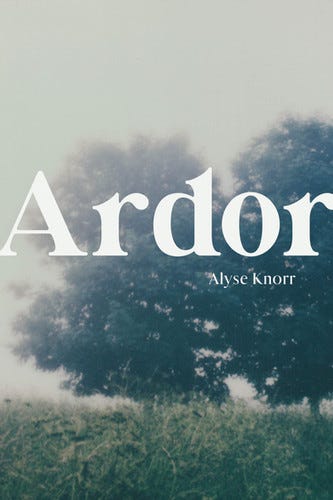
I think there are many ways to find meaning and beauty and joy in the world, and children are only one of them, but for me, having kids cracked open my heart and exposed me to the wondrous beauty of the world in a way that nothing else ever had.
What’s changed in your creative life since becoming a caregiver?
Alyse: Ever since I had children, I have certainly had less total time to put into my creative work–fewer hours of the day or week to commit to my writing practice in general and to specific poems or projects in particular. This is something that’s very difficult about being creative and a caregiver, of course–there just literally aren’t enough hours in the day. And the work of caregiving can be that kind of “busy boredom” that doesn’t lend itself to creative thinking–that’s draining or isolating or, if we’re being honest, kind of empty. I spent an hour today pacing the first floor of my house with my 1-year-old son strapped to my chest in a baby bjorn watching TikTok videos, because he just wanted to dangle off of my person and I was so exhausted that I needed more dopamine hits than the Ezra Klein podcast alone was going to provide me.
Kate: I definitely empathize with Alyse’s description of “busy boredom.” One of the interesting paradoxes of having small children is that I often feel as though I have very little time and also far too much time to use my brain. I’m rarely alone with a blank notebook, but I have a great deal of time where I’m doing nothing in particular, just hanging out at the playground or outside. So I’m looking around at the places where my kids are, which is changing my perspective in many quite literal ways. Previously, I did not spend much time on the ground or looking into drain pipes, and I’m discovering an expansive world down at kid eye-level.
With that said, children are endlessly creative and engaged with the arts. I spend so much of my caregiving time reading books, supervising craft projects, and giving instructions for make-believe dances. It is incredible to have such a close opportunity to see the world as another person sees it–and children really want you to understand their perspectives, to invite you into their vision. I don’t know whether all of this will lead to anything in particular in my creative work, but I think that my kids are expanding my sense of possibility for how to be in the universe, and that can only be good for my writing.
Alyse: I completely agree with Kate that having children has made me a better writer overall. I think there are many ways to find meaning and beauty and joy in the world, and children are only one of them, but for me, having kids cracked open my heart and exposed me to the wondrous beauty of the world in a way that nothing else ever had. That sounds cliche, I know. But watching my daughter discover grass for the first time, or say her first words, or run through the lawn sprinkler shrieking with joy, has allowed me to access a new kind of authenticity and vulnerability in my work. I borrow from her tenderness, her enthusiasm, her glee. I learn from her total openness and newness to everything she sees. She lets me re-discover each word as she learns it. As Kate pointed out, our daughter lets us re-discover each mundane marvel of the world as she sees it, through her very new eyes. And now that we have a second child, I get to do that all over again. In short, it’s miraculous. It’s also, as I mentioned above, mind-numbingly boring and frustrating and exhausting and frankly, often disgusting (tonight I watched avocado come out of the inside of my son’s NOSE). But it’s also amazing. It’s both/and/everything/all of it. My children are not “material” for my writing–they are the wise ones who have gifted me with a new (old? ancient?) way of seeing the world, which I have gratefully taken to my writing/world-observing/life-living practice.
Is there something specific you do to jumpstart creativity?
Kate: One habit I picked up in grad school that has really stuck with me is that when I set aside a morning to write, I usually begin by reading a book of poems. Depending on what I select, reading a book of poems doesn’t take all that long—maybe an hour, maybe two. Building in that time to sit with language helps me transition into a more creative brain space. But I also like to start with reading because it makes me think more expansively about different ways of being in the world. Observing other writers—how they use the language—gets a part of my brain moving that I can’t start otherwise. My rule, however, is that whenever I start to feel the writing itch, even if that’s only halfway through a book, I’m allowed to just put it down and begin writing. Losing the momentum of an idea emerging is much worse than not finishing the book in that sitting!
Alyse: It’s all about the prompts for me. I’ve thrived on prompts since grad school, when my beloved professor Eric Pankey taught workshop by passing out a sheet of prompts each week and my other beloved professor Jennifer Atkinson taught a class called 79 Works, in which all the poets wrote 79 poems over the course of the semester (that’s about six per week!). The only way to achieve a feat like this is with lots and lots of prompts, and that experience imbued in me the power of lowering the stakes by turning each writing session into a game. That’s what prompts do: they remind me that each writing session is a fun exercise, an experiment, an element of my practice–and nothing more. This really reduces the pressure for every single writing session to lead to a Finished Poem or a First Draft of a Future Finished Poem.
I’ve collected writing prompts from various textbooks, online articles, conference talks, and friends over the years and gathered them all together in a big Google Drive folder that I share with all my students. But more often than not, I never even use these in a given writing session and instead pull a random book of poetry off my shelf, flip it open to a random page, and use the poem on that page as a prompt. Like Kate described, I’ll try to emulate something specific about the poem I’ve landed on: its form or approach to lineation, its title, its topic, its first line or phrase, etc. Jumping off another poem is a prompt all its own. And using a prompt lets me get out of my head and into the page quicker than any other technique I’ve ever come across.
Kate: I love this collection of prompts, too. I think we both developed these habits 15 years ago when we were in grad school together, in response to having poet teachers who were really down-to-earth and practical about needing to just get started on writing quickly each day without any fuss. (Actually, I recall one of them recommending the long poem as a form for exactly this reason!) I’m very grateful that I learned some jumpstart tricks when I was young, because my caregiving responsibilities have a set schedule, and knowing how to start also lets me keep writing in small increments.
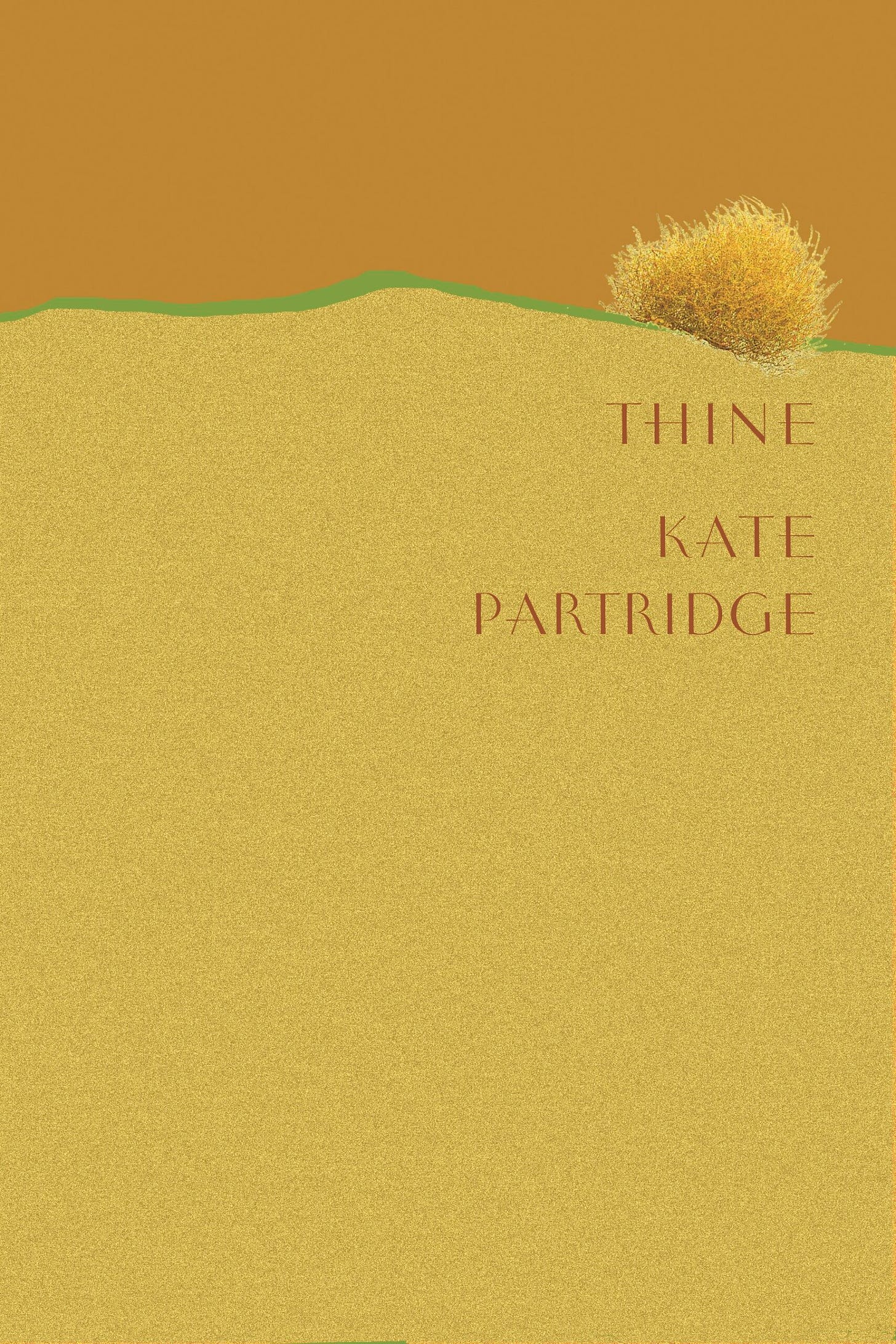
What’s changed about your process? About your medium or genre?
Kate: Writing a poem takes longer now. I might write a draft one day and then not have time to look at it again for weeks. So, the time between my entry into the poem’s ideas and the time when I’m revising or otherwise tending to it might be longer. But this also, I think, allows me to walk around thinking about the poem for longer, gathering (I hope!) more interesting and surprising connections—maybe ones I didn’t have available when I first started.
I almost think of a poem, now, as an idea I’ll carry around for a while. For instance, I’ve been thinking about homesickness, because I have a lot of feelings about raising my kids far away from where I grew up; I’ll start writing with one point of entry into that idea, but by the time I turn to revising again, I’ll have bumped into this thought in other books and conversations and artwork throughout the weeks. This slowing has helped me to think of gathering those materials not only as pre-writing, but of interacting with the world as a form of revision.
❤️️ if you find Kate and Alyse inspiring, click the little red heart at the top or the bottom to help other creative caregivers find us! ❤️️
Alyse: This might be a place where Kate and I differ a bit–I’ve totally given up on the idea of spending a long time with the poem, and I’m too impatient to let it simmer the way Kate does so well. Instead, I write in short bursts. I joke with my other mom friends that there is no efficiency like the efficiency of a mom with 30 spare minutes of work time. I can achieve more in those 30 minutes now than I could in three hours in my pre-kid life. Because work time is so rare for me, I’ve just learned how to really capitalize on it and wring every last minute’s worth of productivity out of it. Every single minute feels like a gift, so I pack it with as many risks and as much concentration as I can. It’s like time somehow dilates to accommodate what I need to do. Before I had kids, I felt constantly busy and like I needed to use every spare minute to get things done. Now that I have kids, I feel the same way, but somehow, through some kind of strange principle of the General Relativity of Motherhood, I can get just as much done in the same amount of time. (I think I read emails way less carefully, and I write even when I have other things on my to-do list that need doing–they can always wait!)
As far as genre goes, I think that having kids has made me more curious and courageous when it comes to exploring new territory. After all, every day I spend raising a child, I’m exposed to some new challenge or surprise, so in the realm of writing, the challenges end up feeling way less intimidating. I mean, what’s harder: teaching yourself to write a novel, or teaching yourself how to teach a 3-year-old how to poop in the toilet instead of their pants?
How do you balance creative practice with care-giving? What advice would you give someone who has a creative practice and is embarking on becoming a caregiver?
Alyse: Without a doubt, the only reason I am able to balance my creative practice with care-giving is the fact that I have such a giving, generous partner, and such a totally equitable marriage. I never take this for granted; I’m grateful every single day that I’m married to someone who “gets it”--who understands that I need time to write, to exercise, to nap, and to have non-writing-related hobbies. Kate supports me 100%, and she is the entire reason I’m able to make art and raise kids at the same time.
Kate: I agree with Alyse–having a network of folks who support you in blocking off time for creative work is essential. I’m so lucky to have that not only in my partner, but in friends, colleagues, and amazing teachers and childcare providers. Writing takes a lot of time, full stop. There are so many pressures to be constantly available for communication in ways that are just not compatible with writing, and there is so much that is fraught in our cultural messaging around women with small children working at all, let alone working in creative fields. I’m very grateful to have people around me who support my decisions and encourage them, and it’s especially useful to have a partner who is modeling the same choices I want to make through her own dedication to creative practice.
Alyse: To get into the nitty-gritty a bit, my advice to anyone trying to balance a creative practice with caregiving (and honestly, anyone trying to do just the caregiving part on its own), is this: make a plan with your partner where you divide up your days or weeks based on total amount of time care-giving. Make this equal down to the 15-minute increments. For instance, if Kate takes the kids from 3:30-5:30 on Mondays and Wednesdays, then I’ll take them from 3:30-5:30 on Tuesdays and Thursdays. It may sound super clinical and un-sexy, but it’s a game-changer to just keep track of it and be this technical. The advantages of this system are as follows:
There’s no bitterness or resentment from perceptions about who’s doing “more” care-giving work! You will always know exactly how much time everyone is putting in. Of course, some weeks this may need to adjust. However, when you leave it up to an ad-hoc system, each person only remembers the labor they’ve put in.
You can actually enjoy your hours “off” without any guilt or worrying. Before we adopted this system, whenever Kate was doing care-giving work, I worried that I was abandoning her or burdening her, and my guilt over taking time to write distracted me from the work of writing itself. With this system, you never have to feel bad taking time, because you know that you gave an equal amount of time as well.
Kate Partridge is the author of two poetry collections: THINE (Tupelo, 2023) and Ends of the Earth (U. of Alaska, 2017). Her poems have appeared in FIELD, Yale Review, Pleiades, Michigan Quarterly Review, Alaska Quarterly Review, Copper Nickel, and other journals. She lives in Denver, where she is an Assistant Professor of English at Regis University.
Alyse Knorr is an associate professor of English at Regis University, co-editor of Switchback Books, and co-producer of the Sweetbitter podcast. She is the author of four poetry collections, most recently Ardor (Gasher Press, 2023), and two non-fiction books, most recently GoldenEye 007 (Boss Fight Books, 2022). Her work has appeared in POETRY Magazine, The New Republic, Alaska Quarterly Review, and The Georgia Review, among others.
more practical advice on balancing caregiving and creative work
novelist on outlining and writing a book 300 words at a time
writer and speaker , on how becoming a mother sharpened her creative focus
how distinguishing between what’s urgent and what’s important can help you keep writing, even when life is chaotic and full
Write More, Be Less Careful is a newsletter about why writing is hard & how to do it anyway. Subscribe to get more encouragement, inspiration, and practical advice sent right to your inbox.
If Write More has helped you in your creative life, I’d love it if you would share it with a friend or click the red heart at the top or bottom of this post so other folks can find us!






